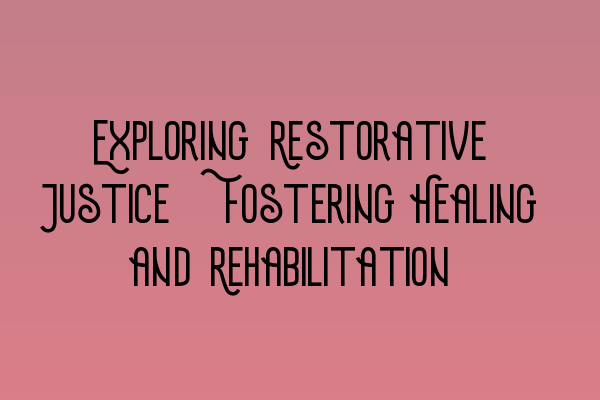Exploring Restorative Justice: Fostering Healing and Rehabilitation
In the criminal justice system, there has been a shift in recent years towards a more holistic approach to dealing with offenders. One such approach gaining attention is restorative justice. This innovative practice focuses on repairing the harm caused by crime by bringing together the victim, offender, and community in a healing process.
Restorative justice aims to move away from a solely punitive approach and towards a process that allows for dialogue, accountability, and reconstruction. It recognizes the importance of addressing the needs of both the victim and the offender, and works towards achieving healing, rehabilitation, and the prevention of future offenses.
The Principles of Restorative Justice
Restorative justice rests on several key principles that guide its implementation:
- Encounter: The victim, offender, and affected parties come together to address the harm caused by the crime.
- Empathy: Participants are encouraged to develop an understanding of each other’s perspectives and experiences.
- Accountability: Offenders take responsibility for their actions and work towards making amends.
- Reparation: The focus is on repairing the harm caused to individuals and communities, rather than solely punishing the offender.
- Reintegration: Efforts are made to reintegrate offenders into society, providing them with opportunities for personal growth and preventing future offenses.
By actively involving the victim and the community, restorative justice seeks to create a safe and supportive environment that facilitates healing and growth for all parties involved. It recognizes that the impact of crime extends beyond just the immediate individuals affected and works towards restoring relationships and building a stronger, more cohesive society.
The Benefits of Restorative Justice
Restorative justice offers a range of benefits over traditional punitive approaches:
- Healing: By offering victims an opportunity to share their experiences and be heard, restorative justice allows for emotional healing and closure.
- Empowerment: Victims are actively involved in the process, giving them a sense of agency and control over their own lives.
- Rehabilitation: By providing offenders with an opportunity to face the consequences of their actions and make amends, restorative justice promotes personal growth, rehabilitation, and reduces the likelihood of reoffending.
- Community Building: Restorative justice strengthens trust and relationships within communities, fostering a sense of accountability and collective responsibility.
Implementing restorative justice requires a comprehensive understanding of its principles and practices. SQE Criminal Law & Practice Law UK provides preparatory courses to equip aspiring legal professionals with the necessary knowledge and skills to navigate this evolving field. To prepare for the SQE exams, consider taking the SQE 1 Practice Exam Questions and SQE 1 Practice Mocks FLK1 FLK2 to test your knowledge and improve your performance.
Conclusion
Restorative justice offers a transformative approach to addressing the harm caused by crime. By prioritizing healing and rehabilitation, it aims to create a more just and inclusive society. To learn more about restorative justice and other topics related to criminal law and practice, explore our range of preparatory courses, including SQE 2 Preparation Courses and SQE 1 Preparation Courses. Stay updated on important dates for the SRA SQE exams by checking the SRA SQE Exam Dates page.
